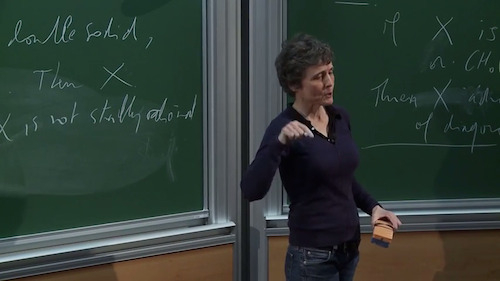The 2016 CNRS Gold Medal is awarded to the mathematician Claire Voisin
Since 1954, the CNRS Gold Medal is annually awarded to a scientist whose research constitutes an exceptional contribution to boost French research and to promote its influence.
Claire Voisin was born in 1962. A researcher at the CNRS for 30 years, she was nominated Professor at the Collège de France in June 2016. As a specialist of complex algebraic geometry and Hodge theory, she yielded spectacular fondamental results in those domains. She was awarded many national and international prizes and is a member of the French Academy of Sciences since 2010. She is married to Jean-Michel Coron, with whom she has five children.

Short Interview of Claire
Claire, may I ask you how you felt when Alain Fuchs phoned you to tell you that you are Gold medalistin 2016?
I was stunned by the news. To me it feels like the Gold medal is for, say, demigods. I felt extremely honored to be picked out by the CNRS: there are so many excellent scientists, and such a boom of knowledge and publications! I also felt apprehension for receiving such an award. But of course, it's wonderful.
Can you tell us what it is that you like in mathematics?
Everything, or almost everything. It's an infinite world, which reveals more and more extraordinary as one goes on: one gets a deeper understanding of the great theorems and also, one has a lot of questions in mind, a lot more questions than one can resolve. I like great theorems, beautiful definitions and big conjectures, but also the little problems which attract you personally and sometimes prove very difficult to solve because they won't fit in any theoretical structure. With mathematics, one can never get bored. Also, it is mostly a solitary work, but I like this aspect of the job.
Do you have a favourite result?
It's difficult to pick one. Complex algebraic geometry grows on very dense results like the 'GAGA' principle, on difficult and dense results like the Hodge's decomposition theorem or the resolution of singularities, and on difficult, beautiful and dense results like Kodaira's embedding theorem or Mori's theorem on the existence of rational curves. More recently, Graber-Harris-Starr or Boucksom-Demailly-Paun-Peternell did magnificent things on rational curves in algebraic varieties. Furthermore, algebraic geometry not only has to do with specific theorems, but also with what Grothendieck would call theories. Sometimes, enunciating the right definition is what does it. I recently worked a lot on the notion of decomposition of the diagonal, which was introduced by Bloch and Srinivas.
What advice would you give to young men and women who want to do maths?
I think that the tendancy to specialised knowledge constitutes a real pitfall for mathematics nowadays. You have to be eager to have a go at everything, even if this attitude is considered a defect rather than a quality. It makes me feel sad to see young people concentrating on a tiny domain. To me, it's important to be able to keep an eye elsewhere, for there is a dynamic process taking place at the intersection of several under-domains, and that dynamics is what makes mathematics evolve on the long run. Therefore, you should not restraint yourself to what you need for immediate research. Also, I'd like to tell young researchers that I sincerely think that mathematics is an ideal job, even though it may be difficult sometimes to deal with the unsettling moments where maths resist you.